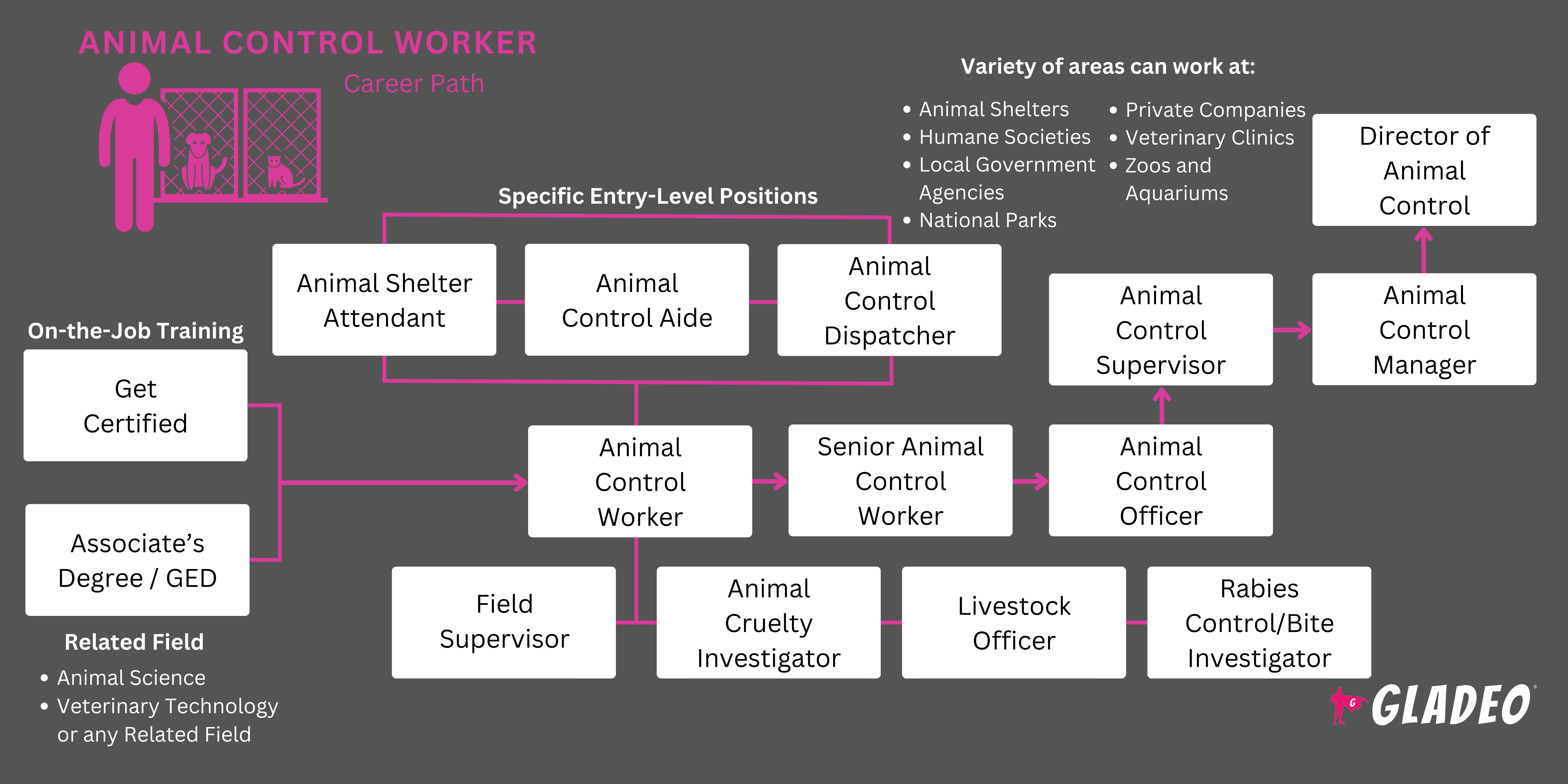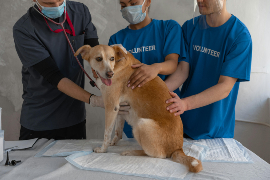Focos de atención
Animal Attendant, Animal Control Officer, Animal Enforcement Officer, Animal Ordinance Enforcement Officer, Animal Park Code Enforcement Officer, Animal Safety Officer, Community Safety Officer, Community Service Officer, Dog Control Officer
Humans have lived peacefully with domesticated animals for thousands of years. But sometimes situations arise when that peace is disrupted. That’s when Animal Control Workers enter the picture!
As experts in animal behavior, these essential workers are on the frontlines helping animals and communities stay safe. They respond to calls about stray or wild animals that could harm people. They’re also called out when an animal is found injured or there’s a concern about animal welfare.
As needed, Animal Control Workers arrive on the scene to investigate claims and figure out the best approach to resolve the situation in accordance with state and local laws. This may require rescuing trapped animals, confiscating abused animals, or capturing lost or stray animals, then driving them to a shelter where they can be safely evaluated. At times, they even have to carefully apply first aid on injured animals directly.
In addition, they investigate reports of animal mistreatment and assist at crime scenes where animals were involved. When applicable, Animal Control Workers will try to contact animal owners if a collar or ID chip is found.
When they’re not busy with the above tasks, they also help raise public awareness on animal-related topics, so that humans and animals can coexist as peacefully as possible!
- Making a significant impact on animal welfare and public safety
- Working directly with animals and contributing to their rescue and rehabilitation
- Engaging with the community to promote responsible pet ownership
- Enjoying a dynamic work environment with plenty of variety for their daily tasks
Horario de trabajo
- Animal Control Workers work full-time with the possibility of nights, weekends, and holidays. They are on the road frequently and must be ready to respond to calls in all sorts of weather and other conditions.
Tareas típicas
- Respond to emergency calls (including rescuing pets in extreme weather conditions)
- Respond to dangerous wildlife animals in residential areas
- Resolve complaints related to animal noise and waste
- Patrol assigned areas to monitor for stray, injured, or endangered animals
- Review cases related to aggressive/dangerous dogs. Examine dog bite incidents
- Rescue animals that are sick, injured, or facing immediate danger
- Coordinate with local animal shelters for the housing and care of captured animals
- Provide emergency care until veterinary care can be arranged
- Inspect pet stores, breeding facilities, and animal boarding operations to ensure compliance with animal welfare standards
- Investigate cases of cruelty, neglect, hoarding, or other harmful actions. Interview witnesses and collect evidence
- Issue warnings and citations to people violating animal control laws
- Collaborate with law enforcement and other agencies during investigations; testify in court, as needed
- Maintain records and databases of animal care and control activities
- Prepare detailed reports of daily activities, incidents, and investigations
- Promote animal welfare through humane education and responsible pet ownership
- Distribute food, supplies, and medical assistance to pet owners in need
Responsabilidades adicionales
- Assist in creating animal control policies and procedures
- Maintain animal control equipment, including traps, vehicles, and protective gear
- Monitor public areas for signs of rabies or other zoonotic diseases
- Coordinate with veterinarians and animal welfare organizations to improve community animal health
- Support local cat initiatives (such as Trap-Neuter-Return/Shelter-Neuter-Return)
- Train new workers and volunteers in proper animal handling and safety procedures
- Participate in emergency response efforts for animals affected by natural disasters
- Collect and properly dispose of deceased animals. Perform animal euthanasia in some states
Habilidades blandas
- Capacidad para trabajar de forma independiente
- Compasión
- Resolución de conflictos
- Pensamiento crítico
- Flexibilidad
- Observador
- Persistencia
- Resolución de problemas
- Ingenio
- Conciencia de seguridad
- Buen juicio y toma de decisiones
- Strength and stamina; ability to lift ~50 lbs
- Gran capacidad de comunicación
Habilidades técnicas
- Animal disease recognition
- Animal rescue and control equipment (collars, leashes, catch poles, carriers, traps, nets, tranquilizers, first aid supplies, pet food, etc.)
- Microchip scanners
- Database management skills
- Driving skills to operate animal control vehicles
- Emergency veterinary care skills for injured animals
- Familiarity with local and state animal control laws
- GPS and mapping programs for navigation and tracking animals
- Knowledge of animal behavior and handling
- Personal protective equipment
- Local governmental agencies
- Independent agencies
- Organizaciones privadas
The job of an Animal Control Worker involves various sacrifices and hardships. It can involve physically demanding work—driving hours around assigned areas, following or chasing animals, and transporting animals to shelters! Sometimes, workers may have to be “on call” in the event of an emergency, too.
There’s also the potential for emotional distress, seeing animals that are injured or have conditions requiring them to be put down. In some cases, the duty of performing animal euthanasia falls on the control worker, if they’re qualified and in a state which allows it.
In addition, there’s the ongoing risk of personal injuries from bites, scratches, or exposure to germs and diseases.
The field of animal control is shifting towards more humane methods like Trap-Neuter-Return for managing animal populations, emphasizing rehabilitation and rehoming over euthanasia.
There’s more focus on preventing issues through public education and community involvement. This includes covering topics such as responsible pet ownership and wildlife coexistence.
A third trend is a rise in the use of GPS, social media, and sophisticated databases for streamlining operations, improving response times, and enhancing community engagement.
Animal Control Workers may have grown up around a lot of different types of animals. They’re usually very compassionate animal lovers who want to assist animals while keeping communities safe. They might have participated in animal-related programs in school or volunteered at animal shelters in their free time.
Educación
- Animal Control Workers need a high school diploma or GED but not a college degree
- Some states or localities require animal control workers to be certified through a training program
- Local community colleges and vocational schools often feature programs or courses specifically tailored to animal control and welfare (such as safe capturing and handling, rendering first aid, public safety, or local laws and regulations)
- New hires undergo on-the-job training to learn procedures for investigations, administrative duties, and other tasks
- Workers may complete specialized certifications such as:
- Animal Control and Law Enforcement Training
- Humane Euthanasia Certification
- Disaster Response for Animal Care Organizations
- Animal Cruelty Investigation Certification
- Wildlife Conflict Resolution Certification
- Pets for Life Program Training
- Animal Welfare Certification
- First Responder Training for Animal Emergency Services
- Basic Wildlife Rehabilitation
- Advanced Wildlife Rehabilitation
- Certified Euthanasia Technician
- Animals in Disasters: Awareness and Preparedness
- State wildlife agencies
- Wildlife Control Certification
- Wildlife Rehabilitation Certification
- Law enforcement training centers
- Animal law enforcement training
- K9 unit management and training
- Animal Control Workers usually need a driver’s license and may be required to submit to a background check and drug screening
- Continuing education is often a requirement of employers, to stay current on laws, tools, and techniques
- A college degree isn’t required for this field. Students who do take college courses should ensure programs have a good reputation
- Consider the cost of tuition, discounts, and local scholarship opportunities (in addition to federal aid via the FAFSA)
- Piensa en tu horario y en tu flexibilidad a la hora de decidir si te inscribes en un programa presencial, online o híbrido
- Tenga en cuenta que algunos programas de formación pueden tener contactos con empresas locales.
- Gain practical experience by volunteering or working part-time at animal shelters, wildlife rehabilitation centers, or with local animal control agencies
- Keep a log of relevant activities and experiences, like volunteer work with animals
- Take biology, zoology, animal science, and environmental science classes in high school
- Enroll in community college or vocational training programs that offer courses in animal welfare, veterinary assistance, wildlife management, or law enforcement with a focus on animal control
- Emphasize learning about public safety, animal law, ethics, and first aid for animals
- Focus on learning how to safely handle animals to avoid injuries
- Study diseases that can affect both animals and humans
- Take advantage of free training opportunities and courses
- Seek shadowing opportunities with professional Animal Control Workers to gain real-world insights into the profession
- Stay physically active to meet the demands of the job
- Obtain your driver’s license and be prepared for the background check and substance screening

- Gain as much practical experience as possible, through volunteering or part-time work
- Use your school’s career center or academic advisors to find job openings and prepare for the job application process
- Sign up for alerts on job portals such as Indeed, Glassdoor, and the National Animal Care & Control Association’s job board, as well as Craigslist for smaller, local opportunities
- Reach out to local government agencies, animal shelters, or wildlife organizations
- Check out examples of Animal Control Worker resumes for ideas
- Tailor your resume to highlight relevant experiences and skills. Don’t forget to include keywords, such as:
- Animal Welfare
- Wildlife Management
- Respuesta de emergencia
- Disease Control
- Animal Handling and Restraint
- Investigation Techniques
- Public Safety and Education
- Rabies Control and Vaccination
- Prepare for interviews by reviewing common interview questions such as “How do you prioritize the ethical and humane treatment of animals in your role as an Animal Control Officer?”
- Network with professionals in the field to learn about job openings and get referrals
- Adhere to safety protocols and wear appropriate protective gear to avoid injuries
- Be punctual and ready to take on the day’s tasks, showing reliability and dedication
- Excel in your duties and continually improve your knowledge and skills
- Take responsibility for your equipment and vehicle, maintaining them in good condition
- Specialize in a niche area within animal control. Pursue additional certifications and training opportunities such as advanced animal control techniques, wildlife rehabilitation, or emergency animal medical response
- Ask your supervisor and colleagues for advice on your professional growth
- Stay updated about technologies, best practices, and regulations
- Take the initiative to study policies and technical manuals
- Train new workers once you’re qualified. Set the bar high for them and lead by example
- Develop strong communication skills for public interactions and stakeholder coordination
- Engage in community outreach and education programs
- Build a strong professional network through conferences and workshops
Páginas web
- American Association of Euthanasia Technicians
- American Humane
- Federal Emergency Management Agency (FEMA)
- International Wildlife Rehabilitation Council
- National Animal Care & Control Association
- The Humane Society of the United States
Libros
- Animal Control Management: A New Look At A Public Responsibility, by Stephen Aronson
- Bleed Control Specialist for Dogs & Cats, by Laura Kendall
- Secrets of an Animal Rescuer: An Animal Control Officer's Passion to Make a Difference, by Shirley Zindler
Animal Control Workers have vital but demanding jobs that can take an emotional and physical toll after a while. If you’re interested in reviewing some additional career fields, check out the options below!
- Trabajador agrícola
- Criador de animales
- Trabajador de control de animales
- Entrenador de animales
- Childcare Worker
- Farmer, Rancher, or Agricultural Manager
- Auxiliar sanitario a domicilio
- Nursing Assistant
- Personal Care Aide
- Veterinario
- Veterinary Assistant and Laboratory Animal Caretaker
- Tecnólogo y técnico veterinario
- Zoólogo y biólogo de la fauna salvaje
Newsfeed

Trabajos destacados

Cursos y herramientas en línea








